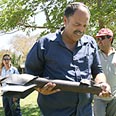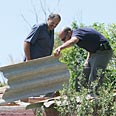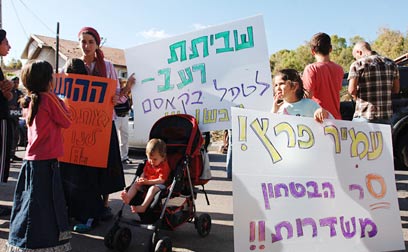

Sderot declares hunger strike
Residents of Qassam-battered town gather opposite home of Defense Minister Amir Peretz to demand security; since Sunday morning 26 rockets hit Sderot area, one of which critically wounded elderly man. Peretz's wife to protesters: I understand your frustration; I too am a victim of this reality
Sderot residents declared a hunger strike Sunday afternoon in front of Defense Minsiter Amir Peretz’s house to protest the non-stop Qassam barrage that has plagued the western Negev town recently. Since the morning hours, 26 rockets hit the town and areas surrounding it, one of which seriously wounded Yonatan Angel, 60, while he set up classrooms at the local elementary school.

Rally outside Peretz's Sderot home (Photo: Amir Cohen)
A few dozen residents are planning to set up protest tents on the site. Sunday afternoon residents negotiated with police in an attempt to get authorization for the protest and hunger strike, but police have thus far refused to provide permits. With that, Sderot locals are determined to hold the hunger strike.
During the rally two Qassams landed in the city, and two women suffered from anxiety. One rocket landed on Ha’aliyah Street in the southern part of the city, causing damage to a sidewalk. The second Qassam landed in an open area, apparently near the local cemetery.
During the week a few prominent residents established the “Let Sderot live” forum, which organized the protest. They said they expected many other residents to show up to exhibit solidarity with the protest. “We came with the clear aim to take our fate in our hands and fight for our security, because we have seen that no one cares about us and no one is willing to hear our problems. We very much hope that people will come from all over the country, and we, anyway, plan to go through with our promise not to eat until the security establishment regains its composure and gives us security,” said Alon Davidi, one of the forum founders.
'We’ll protest until we see the end of this'
Among the protestors is Yonatan Abukasis, who lost his 17-year-old daughter Ayala-Haya in a Qassam attack.
“I think that after I paid such a dear price and we didn’t get security, there is no other way but to hunger strike. This government only understands this method, unfortunately. People went hungry and got the medicines to save their lives, and we’ll hunger strike to get the security that will save ours. I, more than others, am very sensitive to Qassam fire, and every explosion makes me jump. But more than anything, I am annoyed by the promises that weren’t kept and the prime minister won’t even talk or listen to us,” Abukasis said.
“Peretz isn’t responsible for what is happening. We supported his policies, but the one who establishes policy is the prime minister. If (Ehud) Olmert’s daughter could protest against her father, we at least expect her father to show solidarity with the protestors here in Sderot. Anyway, we’ll protest until we see the end of this, or until the government admits the army can’t protect us so the army is not needed,” he added.
During the rally Peretz’s wife Ahlama came out of the house to meet the demonstrators, who asked that she influence her husband to act.
“We expect your husband to put an end to this reality,” one protester said.
Ahlama responded by saying, “I understand your frustration; I too am a victim of this reality. I have been living in this atmosphere for the past five years, just like the rest of Sderot’s residents – but there is no lightning solution; we need dialogue and patience.”
Earlier residents reached the Disengagement Authority, which still has a branch in the town since the withdrawal was carried out last summer, and demanded an evacuation-compensation authority be set up for them as well so they can leave the town.
'The children are afraid'
Sderot residents are full of bitterness and fear amid the recent escalation, and the city has almost become a ghost town. Shops and restaurants are open as usual, but business is slow; people are too busy running through the streets seeking shelter.
Six-year-old Diana Rafaes, clutching her mother Alamaz’s hand tightly, said “we went to school today, but they told is it was closed because a man was hurt in the Qassam attacks; so I went back home, and now I am with mom. When there’s a Qassam run down from our apartment on the third floor to the second to hide until it’s over.”
Her mother Alama said, “The children are afraid; we all are. This is a terrible situation. You can’t go to work in peace because there are hardly any jobs available; so you hold on and try to survive.”
Mark Schneider, a local 12th grader, said “we haven’t studied regularly for the past four years. I don’t know how I managed to take the exams – you sit down and suddenly, in the middle of a matriculation exam – boom, a Qassam. And if there is no Qassam, you’re always fearful that one may land at any given moment. It’s simply terrible.”















